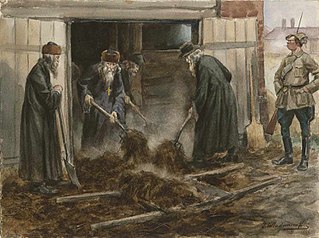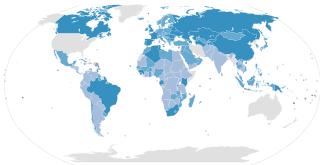| C31 | |
|---|---|
| ILO Convention | |
| Date of adoption | June 18, 1931 |
| Date in force | Withdrawn May 30, 2000 |
| Classification | Hours of Work |
| Subject | Working Time |
| Previous | Hours of Work (Commerce and Offices) Convention, 1930 |
| Next | Protection against Accidents (Dockers) Convention (Revised), 1932 |
Hours of Work (Coal Mines) Convention, 1931 was an International Labour Organization Convention.
It was established in 1931:
Having decided upon the adoption of certain proposals with regard to hours of work in coal mines,...
The convention was never brought into force.
The principles of the convention were subsequently revised by ILO Convention C46.
The convention was never brought into force, and it was withdrawn May 30, 2000 at the ILO General Conference.

The International Labour Organization (ILO) is a United Nations agency whose mandate is to advance social and economic justice through setting international labour standards. Founded in October 1919 under the League of Nations, it is the first and oldest specialised agency of the UN. The ILO has 187 member states: 186 out of 193 UN member states plus the Cook Islands. It is headquartered in Geneva, Switzerland, with around 40 field offices around the world, and employs some 3,381 staff across 107 nations, of whom 1,698 work in technical cooperation programmes and projects.

Child labour refers to the exploitation of children through any form of work that deprives children of their childhood, interferes with their ability to attend regular school, and is mentally, physically, socially and morally harmful. Such exploitation is prohibited by legislation worldwide, although these laws do not consider all work by children as child labour; exceptions include work by child artists, family duties, supervised training, and some forms of child work practiced by Amish children, as well as by indigenous children in the Americas.

Forced labour, or unfree labour, is any work relation, especially in modern or early modern history, in which people are employed against their will with the threat of destitution, detention, violence including death, compulsion, or other forms of extreme hardship to either themselves or members of their families.

The second MacDonald ministry was formed by Ramsay MacDonald on his reappointment as Prime Minister of the United Kingdom by King George V on 5 June 1929. It was only the second occasion on which the Labour Party had formed a government; the First MacDonald Ministry held office in 1924.

The ILO Convention concerning Minimum Age for Admission to Employment C138, is a convention adopted in 1973 by the International Labour Organization. It requires ratifying states to pursue a national policy designed to ensure the effective abolition of child labour and to raise progressively the minimum age for admission to employment or work. It is one of eight ILO fundamental conventions. Convention C138 replaces several similar ILO conventions in specific fields of labour.
Hours of Work Convention (Revised), 1935 was an International Labour Organization Convention that never came into force and was withdrawn.
Reduction of Hours of Work Convention, 1936 is an International Labour Organization Convention.
Paid Vacations (Seafarers) Convention, 1946 is an International Labour Organization Convention.
The Convention concerning Wages, Hours of Work on Board Ship and Manning is a convention of the International Labour Organization originally drafted in 1946 and revised conventions in 1949 and 1958, none of which entered into force.
Reduction of Hours of Work (Textiles) Convention, 1937 is an International Labour Organization Convention.
Migration for Employment Convention, 1939 is an International Labour Organization Convention.
Safety and Health in Mines Convention, 1995 is an International Labour Organization Convention. It was adopted at the 82nd International Labour Conference (ILC) of the International Labour Organization (ILO). The ILO is an agency under the United Nations that deals with international labor issues while promoting workers rights and opportunities. One of ILO's goals is to hold annual labor conventions to create legally binding contracts for participating nations to ratify. During the Safety and Health in Mines Convention (C176), it was recognized that there are inherent hazards in the mining workplace, and a need for a convention was mandatory.
Seafarers' Hours of Work and the Manning of Ships Convention, 1996 is an International Labour Organization Convention.
Work in Fishing Convention (2007) C 188, was adopted at the 96th International Labour Conference (ILC) of the International Labour Organization ILO in 2007. The objectives of the Convention is to ensure that fishers have decent conditions of work on board fishing vessels with regard to minimum requirements for work on board; conditions of service; accommodation and food; occupational safety and health protection; medical care and social security. It applies to all fishers and fishing vessels engaged in commercial fishing operations. It supersedes the old Conventions relating to fishermen.

The Maritime Labour Convention (MLC) is an International Labour Organization convention, number 186, established in 2006 as the fourth pillar of international maritime law and embodies "all up-to-date standards of existing international maritime labour Conventions and Recommendations, as well as the fundamental principles to be found in other international labour Conventions". The other "pillars are the SOLAS, STCW and MARPOL. The treaties applies to all ships entering the harbours of parties to the treaty, as well as to all ships flying the flag of state party.
The Conventions concerning Employment of Women during the Night are conventions drafted by the International Labour Organization (ILO) which prohibit women from performing industrial work during the night. The first convention was adopted in 1919 and revised versions were adopted in 1934 and 1948. A protocol to the convention was adopted in 1990 allowing for easing of the restriction under conditions. As of April 2011 the conventions had 27, 15, 46 (undenounced) ratifications respectively. The protocol was ratified 5 and denounced by 2.

The Convention on Domestic Workers, formally the Convention concerning Decent Work for Domestic Workers is a convention setting labour standards for domestic workers. It is the 189th ILO convention and was adopted during the 100th session of the International Labour Organization. It entered into force on 5 September 2013.
International labour law is the body of rules spanning public and private international law which concern the rights and duties of employees, employers, trade unions and governments in regulating the workplace. The International Labour Organization and the World Trade Organization have been the main international bodies involved in reforming labour markets. The International Monetary Fund and the World Bank have indirectly driven changes in labour policy by demanding structural adjustment conditions for receiving loans or grants. Issues regarding Conflict of laws arise, determined by national courts, when people work in more than one country, and supra-national bodies, particularly in the law of the European Union, has a growing body of rules regarding labour rights.
Child labour laws are statutes placing restrictions and regulations on the work of minors.

Asia is rich in mineral resources due to unique geographical conditions. The main minerals are petroleum, coal, iron, manganese, tin, tungsten, antimony, copper, lead, zinc, aluminum, gold, silver, mica and precious stone.